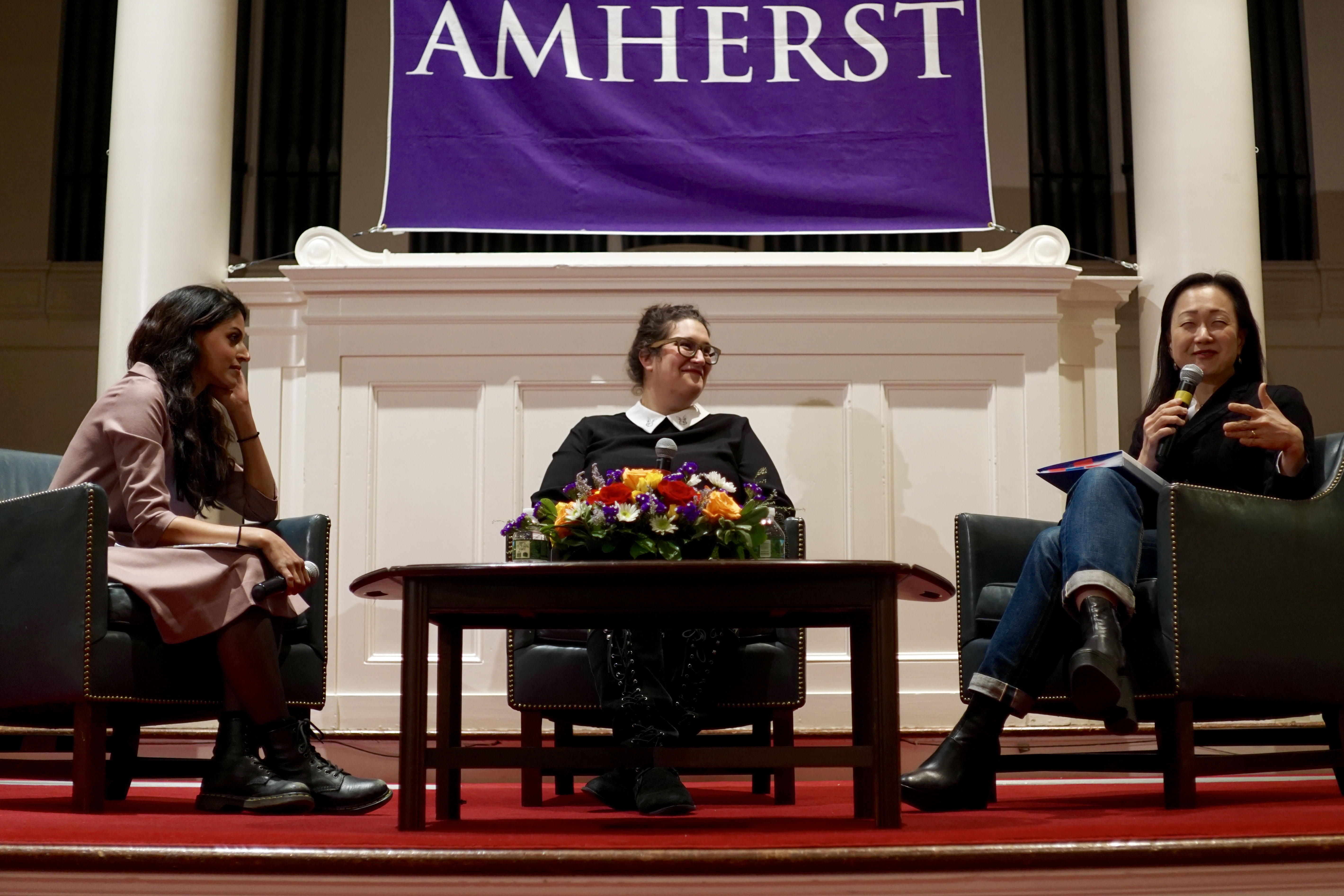

National Book Award finalists Min Jin Lee and Carmen Maria Machado spoke at Amherst on March 1 as part of Lit Fest, a three-day literary festival sponsored by Amherst College-affilitated literary magazine The Common, the Emily Dickinson Museum and the Center for Humanistic Inquiry (CHI).
Lee is the author of “Pachinko,” a novel that follows four generations of a family, which first lives in Japanese-occupied Korea during the early 1900s and later lives in Japan from before World War II until the 1980s.
Machado is a National Book Award finalist for her short story collection “Her Body and Other Parties,” which incorporates aspects of a variety of genres including science fiction, fantasy, humor and psychological realism in stories about queerness and gender, among other topics.
Jennifer Acker ’00, editor-in-chief of The Common and founder of Lit Fest, began by introducing Lee, Machado and Parul Seghal, a literary critic at The New York Times, who moderated the event.
Seghal began the conversation by asking the authors about their writing processes.
Lee said that her writing usually evolves out of an idea rather than a story. “I don’t think so much about writing a story, believe it or not,” Lee said. “I’m a very idea-based person, so I start with an idea and then I work with a thesis and I do a ton of research and then the story comes after. I’m not a very traditional fiction writer. I’m an idea writer and that makes me really weird.”
The two authors then read passages from their books. Afterwards, Seghal asked Lee and Machado to speak on the narrators of their books.
Machado described the pressure felt by the narrator of her short story, “The Husband Stitch,” which is part of her collection.
“My narrator knows it’s a tragedy and she’s moving towards the tragedy with every beat and by telling the story, she is moving closer to her own death,” Machado said. “But she does it anyway because the story must be told. So for me it’s a little less benevolent and a little more like it’s the way it must be and someone needs to tell a story and it’s me.”
The narrator of “Pachinko,” Lee said, is a more omniscient narrator that embodies her best qualities. “My narrator is the best part of me,” she said. “She’s the part of me that has love for every person despite every situation, and I want to be that person, but it’s really difficult and, as a matter of fact, I suck at it. But my narrator is also a person who is revised.”
Both authors explore various themes surrounding sex in their fiction writing. Lee spoke about her experience as a journalist and the discussions she has with people about sex.
“I didn’t realize how many women want to stop having sex at a certain point in their life,” Lee said “I’ve talked with a lot of women about the change of sexual habits and appetites, and I wanted to have that kind of discussion in fiction because we shouldn’t act like we always want sex. I wanted to write about it and put it out there because I think sexuality and all these other phases are a part of everyone’s life and it should be in fiction.”
Machado added that she was not seeing sex portrayed in a way that she wanted. “What I’ve noticed is that a lot of times writing about sex will be very euphemistic, and oftentimes when I was reading it, I was reading it mostly from male authors with this deep, deep contempt for the female body,” Machado said.
Filling this gap and representing those who are not typically seen in literature or other art forms is something that Machado spent time originally agonizing over but eventually came to terms with, she said.
“I had a lot of anxiety about being a certain kind of voice,” Machado said. “I just worried that people would say ‘Oh you wrote about a crazy lesbian, how original,’ but I’m a lesbian woman with mental health issues so I am that thing. I felt like I was spinning in circles, and I ultimately just decided that I had to write the stories that made sense to me.”
A brief Q&A session followed the conversation, during which they discussed critics’ reception of their books.
Isabel Meyers ’20 attended the event and found inspiration from authors talking about their books. “It was refreshing to hear women up on stage really owning their literary success,” Meyers said. “I felt seriously inspired by the authors’ dedication to write the stories they felt were missing or underrepresented from mainstream literature.”